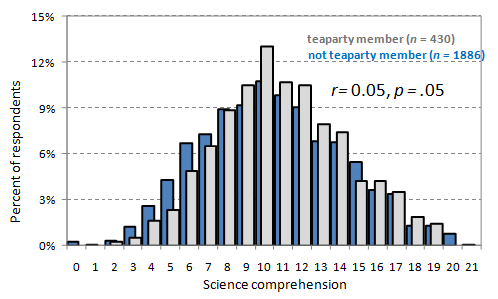| | Thanks, Ed! I stand corrected. In fact, we all can!
Conservatives tend to be less knowledgeable in science than liberals. However, self-identified Tea Party conservatives tend to be more science-literate than other conservatives. I found the author's website (see below) Daniel Kahan "Cultural Cognition" project.
In this dataset, I found that there is a small correlation (r = -0.05, p = 0.03) between the science comprehension measure and a left-right political outlook measure, Conservrepub, which aggregates liberal-conservative ideology and party self-identification. The sign of the correlation indicates that science comprehension decreases as political outlooks move in the rightward direction--i.e., the more "liberal" and "Democrat," the more science comprehending.

But if you do, then maybe you'll find this interesting. The dataset happened to have an item in it that asked respondents if they considered themselves "part of the Tea Party movement." Nineteen percent said yes.
It turns out that there is about as strong a correlation between scores on the science comprehension scale and identifying with the Tea Party as there is between scores on the science comprehension scale and Conservrepub. 
Except that it has the opposite sign: that is, identifying with the Tea Party correlates positively (r = 0.05, p = 0.05) with scores on the science comprehension measure:
http://www.culturalcognition.net/kahan
The sign of the correlation indicates that science comprehension decreases as political outlooks move in the rightward direction--i.e., the more "liberal" and "Democrat," the more science comprehending.
Yes, the tea party is just like everyone else -- which is to say, highly vulnerable to the reason-effacing consequences of our polluted science communication environment.
http://www.culturalcognition.net/blog/2013/10/15/some-data-on-education-religiosity-ideology-and-science-comp.html
|
|
